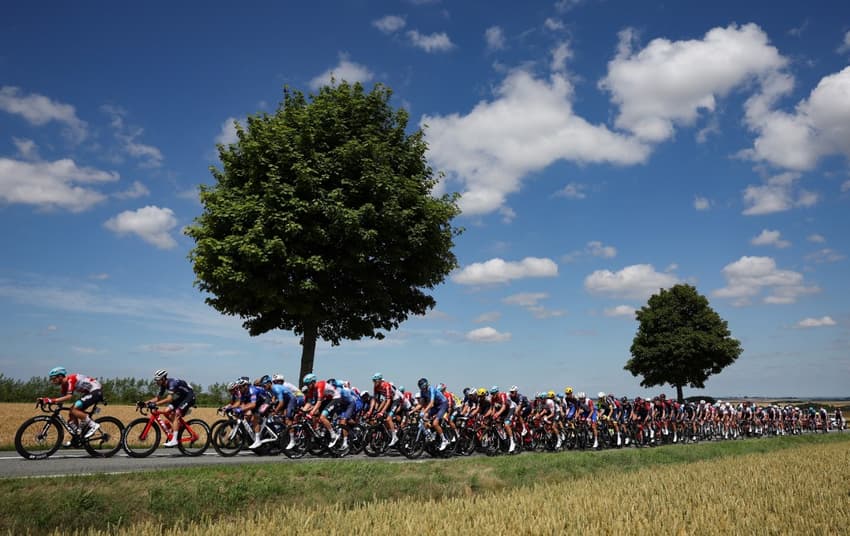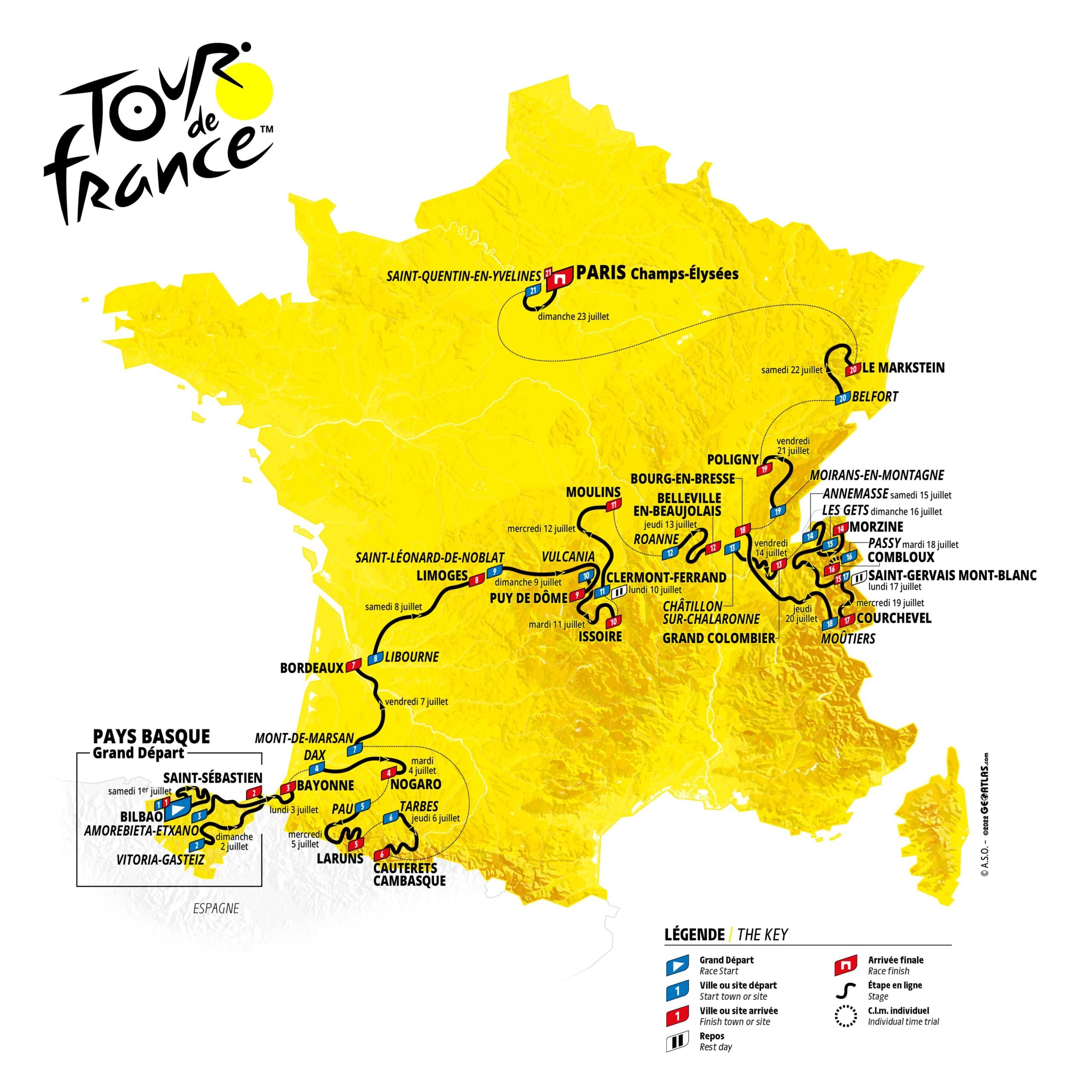MAP: What you need to know about the 2023 Tour de France

The Tour de France begins on Saturday, with riders facing a Spanish start and a climb up the highest volcano in France before the traditional race finish in Paris.
This year's event will be held in its usual time slot, while next year's will be held earlier and will finish in Nice, in order to accommodate the Paris 2024 Olympics.
The 2023 race begins on Saturday, July 1st in Bilbao, Spain, and riders will cycle 3,404km before finishing on July 23rd with the traditional ending on the Champs-Elysée in Paris.
Riders will go from Bilbao to San-Sebastian before heading through the Basque country and crossing the Pyrenees into Bayonne.
From there the route moves through south-west France including Bordeaux before heading into the Massif Central, including a climb up Pûy de Dome, the highest volcano in the Auvergne region of France.
In total it includes five mountain ranges and 30 climbs - seven more than the 2022 event.
The women's race - a 1,000km route starting from Clermont Ferrand in central France - runs from July 23rd to 30th.

In detail
The 3,404km route features eight mountain stages and four hilly stages with just one medium length individual time trial placed early in the final week.
The route however ignores almost all of western and northern France.
"Over five or six years it evens out and we eventually get everywhere," race organiser Christian Prudhomme said.
The killer stage in the 21-day race appears to be stage 17 from Saint-Gervais Mont-Blanc to Courchevel, doted with four peaks and ascending way above the tree line to 2,300m of altitude where the oxygen is thin.
That kind of mountain stage would appear tailor-made for 2019 champion Egan Bernal and would give him hope against the two men who have won the title since, Tadej Pogacar and Jonas Vingegaard.
Gone is the day-20 individual time-trial that produced such drama in the last two editions.
Instead organisers this year placed a blockbuster mountain run on that 20th stage from Belfort to Le Markstein Fellering, with a devastating five mountains to climb on what is ostensibly the final day.
The women's Tour de France route involves a 1,000km route starting from Clermont Ferrand and taking the riders through the south and an ascent of the Col du Tourmalet in the Pyrenees as its highlight.
The #TDFF2023 avec @GoZwift:
🚩 956 km
⛰ 1 mountain stage
💪 2 punchy stages
💨 4 flat stages
⏱ 1 ITT
Le #TDFF2023 avec Zwift en chiffres :
🚩 956 km
⛰ 1 étape de montagne
💪 2 étapes accidentées
💨 4 étapes de plaine
⏱ 1 clm individuel pic.twitter.com/4LyKvuvvgW
— Le Tour de France Femmes avec Zwift (@LeTourFemmes) October 27, 2022
Continuing efforts to enliven the racing, especially the early action, the 2023 men's route is laced with terrain tempting the great one-day specialists to soak up some glory.
The forested hills around Bilbao on stage one are an open invitation for the one-day specialists to go all in for the coveted overall leader's yellow jersey right from day one.
That should also force a first minor skirmish among the overall contenders.
A daredevil finale on the 20km descent to the chic coastal resort of San Sebastian is likely to provide a show on stage two.
Day three takes the action back to France where the 22 teams of eight riders each move into the Pyrenees on the first weekend with storied mountains the Tourmalet and Aspin bringing the overall contenders into the thick of the battle.
The race then heads towards the Massif Central where the giant volcano Pûy de Dome awaits before stints in the Jura, the Alps and finally the Vosges.
There are high-altitude finish lines at Cauterets-Cambasque, Puy de Dôme, Grand Colombier and Saint-Gervais Mont-Blanc.
Tradition suggests the race will be won in the Alps, but can only be clinched on stage 20 in the Vosges where five mountains could deliver a late twist. The first ten days however offer an open invitation to the emerging 'total cycling' adepts in the peloton.
This 110th edition of the Tour de France will be broadcast in 190 countries.
Comments
See Also
This year's event will be held in its usual time slot, while next year's will be held earlier and will finish in Nice, in order to accommodate the Paris 2024 Olympics.
The 2023 race begins on Saturday, July 1st in Bilbao, Spain, and riders will cycle 3,404km before finishing on July 23rd with the traditional ending on the Champs-Elysée in Paris.
Riders will go from Bilbao to San-Sebastian before heading through the Basque country and crossing the Pyrenees into Bayonne.
From there the route moves through south-west France including Bordeaux before heading into the Massif Central, including a climb up Pûy de Dome, the highest volcano in the Auvergne region of France.
In total it includes five mountain ranges and 30 climbs - seven more than the 2022 event.
The women's race - a 1,000km route starting from Clermont Ferrand in central France - runs from July 23rd to 30th.

In detail
The 3,404km route features eight mountain stages and four hilly stages with just one medium length individual time trial placed early in the final week.
The route however ignores almost all of western and northern France.
"Over five or six years it evens out and we eventually get everywhere," race organiser Christian Prudhomme said.
The killer stage in the 21-day race appears to be stage 17 from Saint-Gervais Mont-Blanc to Courchevel, doted with four peaks and ascending way above the tree line to 2,300m of altitude where the oxygen is thin.
That kind of mountain stage would appear tailor-made for 2019 champion Egan Bernal and would give him hope against the two men who have won the title since, Tadej Pogacar and Jonas Vingegaard.
Gone is the day-20 individual time-trial that produced such drama in the last two editions.
Instead organisers this year placed a blockbuster mountain run on that 20th stage from Belfort to Le Markstein Fellering, with a devastating five mountains to climb on what is ostensibly the final day.
The women's Tour de France route involves a 1,000km route starting from Clermont Ferrand and taking the riders through the south and an ascent of the Col du Tourmalet in the Pyrenees as its highlight.
The #TDFF2023 avec @GoZwift:
— Le Tour de France Femmes avec Zwift (@LeTourFemmes) October 27, 2022
🚩 956 km
⛰ 1 mountain stage
💪 2 punchy stages
💨 4 flat stages
⏱ 1 ITT
Le #TDFF2023 avec Zwift en chiffres :
🚩 956 km
⛰ 1 étape de montagne
💪 2 étapes accidentées
💨 4 étapes de plaine
⏱ 1 clm individuel pic.twitter.com/4LyKvuvvgW
Continuing efforts to enliven the racing, especially the early action, the 2023 men's route is laced with terrain tempting the great one-day specialists to soak up some glory.
The forested hills around Bilbao on stage one are an open invitation for the one-day specialists to go all in for the coveted overall leader's yellow jersey right from day one.
That should also force a first minor skirmish among the overall contenders.
A daredevil finale on the 20km descent to the chic coastal resort of San Sebastian is likely to provide a show on stage two.
Day three takes the action back to France where the 22 teams of eight riders each move into the Pyrenees on the first weekend with storied mountains the Tourmalet and Aspin bringing the overall contenders into the thick of the battle.
The race then heads towards the Massif Central where the giant volcano Pûy de Dome awaits before stints in the Jura, the Alps and finally the Vosges.
There are high-altitude finish lines at Cauterets-Cambasque, Puy de Dôme, Grand Colombier and Saint-Gervais Mont-Blanc.
Tradition suggests the race will be won in the Alps, but can only be clinched on stage 20 in the Vosges where five mountains could deliver a late twist. The first ten days however offer an open invitation to the emerging 'total cycling' adepts in the peloton.
This 110th edition of the Tour de France will be broadcast in 190 countries.
Join the conversation in our comments section below. Share your own views and experience and if you have a question or suggestion for our journalists then email us at [email protected].
Please keep comments civil, constructive and on topic – and make sure to read our terms of use before getting involved.
Please log in here to leave a comment.